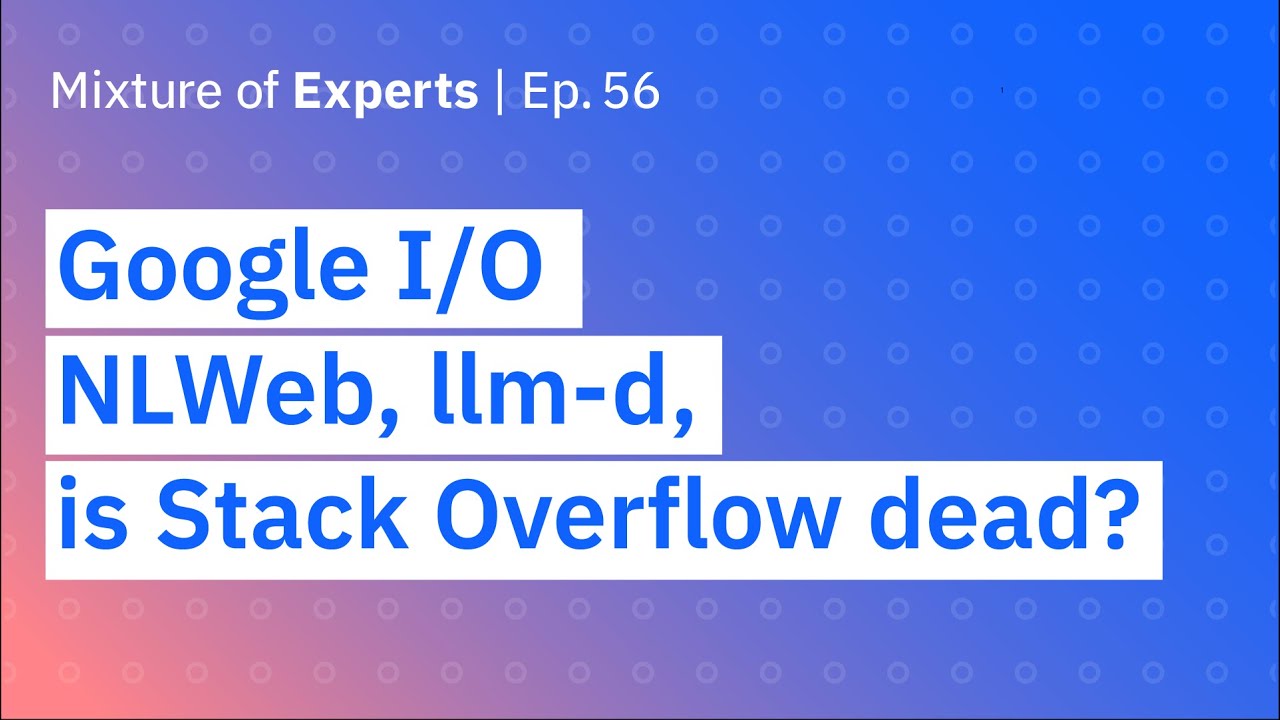The episode discusses the future of AI in filmmaking, web infrastructure, and developer tools, highlighting advancements like Google’s multimodal AI, open-source LLM deployment with llm-d, and Microsoft’s NL Web project, while also addressing concerns about the decline of platforms like Stack Overflow due to AI-generated code. It emphasizes how these innovations are shaping a more interconnected, AI-driven digital ecosystem, with ongoing debates about the impact on traditional industries and knowledge communities.
The episode of Mixture of Experts begins with a discussion on the future of movies, where experts predict that by 2030, most summer blockbuster films will be entirely computer-generated. Marina Danilevsky, a Senior Research Scientist, expresses hope that traditional filmmaking with real actors will continue, while Abraham Daniels, a Senior Technical Product Manager, hopes that Hollywood remains rooted in live-action movies, despite advances in AI-generated content. Gabe Goodhart, Chief Architect of AI Open Innovation, notes that animated movies are already predominantly computer-generated, and foresees AI playing a significant role in enhancing special effects rather than replacing live-action filmmaking altogether.
The conversation then shifts to Google I/O, Google’s annual developer conference, which was heavily focused on AI advancements. Key announcements included a new $250 AI subscription plan, the launch of VEO 3—a video generation model capable of text-to-video and audio synthesis—and the emphasis on multimodal AI capabilities. Abraham Daniels discusses the potential impact of these technologies on Hollywood, expressing skepticism about AI fully replacing traditional filmmaking due to current limitations in generating long-form, high-quality video content. Marina highlights Google’s strategic focus on multimodality, which could strengthen its position in AI, but notes that user engagement and data collection remain crucial for maintaining market dominance.
Next, the episode explores the decline of Stack Overflow, a beloved platform for technical questions, which has seen decreasing traffic partly due to AI tools that generate code snippets automatically. Marina reflects on the long-term implications, warning that AI might erode the need for human expertise in nuanced technical questions, leading to a regression toward homogenized answers. She advocates for a collaborative approach where AI-generated solutions are shared and improved upon, maintaining a valuable repository of knowledge. Gabe adds that supporting such ecosystems through open standards and protocols could help sustain the community and ensure that valuable expertise continues to be recognized and rewarded.
The discussion then turns to the launch of llm-d, an open-source project aimed at enabling scalable, efficient deployment of large language models (LLMs) using Kubernetes. Gabe explains that this tool addresses the unique traffic patterns of LLMs, which differ significantly from traditional web traffic, by optimizing request routing and prefix caching to maximize GPU utilization and reduce costs. Marina emphasizes that open-sourcing such infrastructure is vital for democratizing AI deployment, especially for enterprises that cannot rely solely on hyperscalers. She sees this as part of a broader trend where foundational AI infrastructure becomes standardized, much like databases or web protocols, fostering innovation and competition.
Finally, the episode discusses Microsoft’s NL Web project, which aims to turn websites into AI-accessible resources through a standardized protocol. Marina interprets this as a move toward a web where content is more discoverable and interactable by AI agents, potentially transforming how users engage with online information. Gabe notes that such protocols could become the backbone of an AI-driven internet, enabling seamless communication between websites and agents. Marina adds that while this vision is promising, widespread adoption will depend on economic incentives, security considerations, and the willingness of content creators to open their data. Overall, the episode highlights a rapidly evolving AI landscape where infrastructure, protocols, and community ecosystems are shaping the future of digital interaction.
